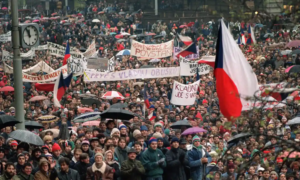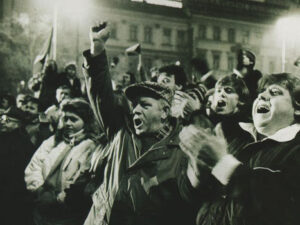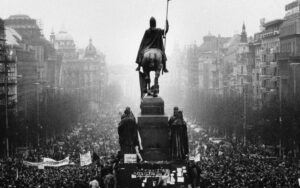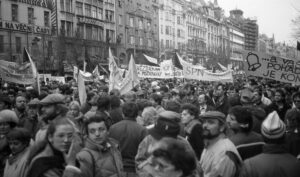
 I would think that the fall of the Berlin Wall on November 17, 1989, would have signaled the end of an era of oppressive treatment of people in the area. Nevertheless, just nine days after the fall, and approximately 200 miles south, a large group of students descended into Prague, Czechoslovakia, to protest against the communist regime in their area. This demonstration sparked the onset of the Velvet Revolution, which was the peaceful overthrow of the Czechoslovak government. It was part of a wave of anti-communist revolutions that developed in the late 1980s and early 1990s.
I would think that the fall of the Berlin Wall on November 17, 1989, would have signaled the end of an era of oppressive treatment of people in the area. Nevertheless, just nine days after the fall, and approximately 200 miles south, a large group of students descended into Prague, Czechoslovakia, to protest against the communist regime in their area. This demonstration sparked the onset of the Velvet Revolution, which was the peaceful overthrow of the Czechoslovak government. It was part of a wave of anti-communist revolutions that developed in the late 1980s and early 1990s.
This wasn’t just a random protest. Protesters selected November 17th to coincide with International Students Day, marking the 50th anniversary of a Nazi assault on the University of Prague. That attack had resulted in nine deaths and the imprisonment of 1,200 students in concentration camps. The area was governed by a single communist party aligned with Moscow since World War II’s conclusion, the Czechoslovak government permitted very little anti-government expression and severely repressed opposition. Strangely, the government authorized the march on International Students Day. In recent years, as the Soviet Bloc’s economy faltered and democratic movements toppled communist governments in Poland and Hungary, anti-government sentiment has grown increasingly pronounced.
Students shouting anti-government slogans filled the streets of Bratislava and Prague. There were confrontations with the police, but officially, no fatalities were reported. Despite police crackdowns, the protests overflowed into other cities and increased rapidly. Theater employees transformed their stages into public debate platforms, and the movement swelled to encompass a diverse cross-section of society. On November 20th, half a million demonstrators gathered in Prague’s Wenceslas Square.
Shortly after the initial protests, it became clear that one-party rule in Czechoslovakia was ending. The Communist Party’s leadership stepped down on November 28th, and by December 10th, an anti-communist government had taken office. Václav Havel, a renowned writer and dissident, was elected president on December 29th, serving as Czechoslovakia’s final president. Subsequently, the Czech and Slovak regions amicably parted ways in the so-called Velvet Divorce, and in 1993, Havel became the first president of the newly established Czech Republic.
It was an amazing feat for the students. Somehow, they managed to pull off a peaceful regime change. The oppressive regime they had always known, was replaced with two free nations and peace. Peaceful revolutions 
 are pretty much unheard of. Dictatorships hate to relinquish their power over their helpless citizens, and typically, the students just don’t have much pull in government, although that may be changing. Nevertheless, in a time when they shouldn’t have been able to pull it off, the students of Prague, Czechoslovakia managed an unbelievable feat.
are pretty much unheard of. Dictatorships hate to relinquish their power over their helpless citizens, and typically, the students just don’t have much pull in government, although that may be changing. Nevertheless, in a time when they shouldn’t have been able to pull it off, the students of Prague, Czechoslovakia managed an unbelievable feat.


One Response to The Velvet Revolution